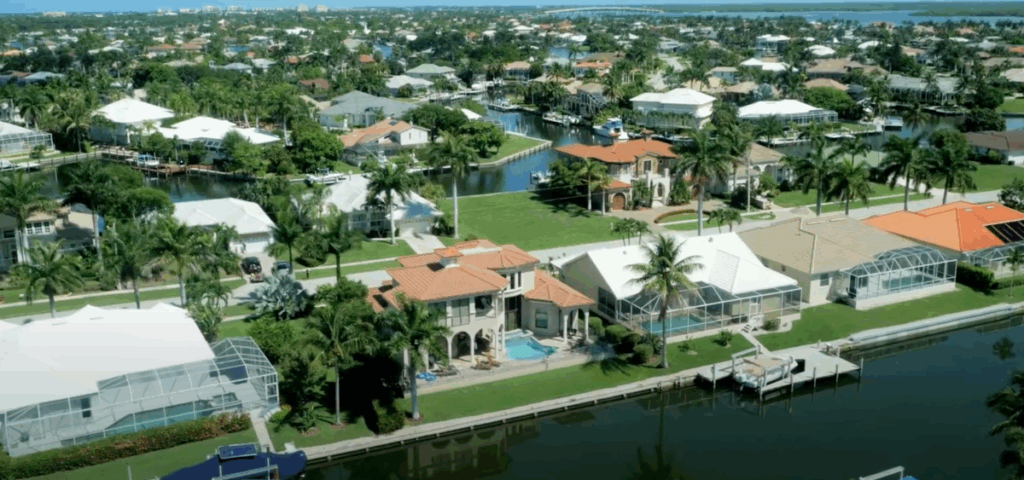
Moving to Marco Island, Florida: A Comprehensive Relocation Guide
Considering moving to Marco Island, Florida? This exclusive barrier island offers pristine beaches, resort lifestyle, and natural beauty. With approximately 18,000 permanent residents in 2025, Marco Island combines luxury living with Ten Thousand Islands access and Southwest Florida’s premier island experience.
Demographic Profile to Consider If Moving to Marco Island:
Marco Island’s 2025 permanent population is approximately 18,000 residents, though seasonal population swells significantly higher. The median age is around 65 years, reflecting the island’s appeal to affluent retirees. The population is approximately 95% White, creating a predominantly wealthy retirement community. Marco Island is Florida’s largest barrier island along the Gulf Coast, featuring luxury high-rise condominiums along Collier Boulevard, waterfront estates with boat access, and resort developments. The island offers upscale restaurants, shopping, and marinas. Marco Island attracts wealthy retirees, second-home owners, and those seeking exclusive Gulf Coast lifestyle. The community emphasizes boating, beaches, and resort amenities. The island’s northern location provides proximity to Naples while maintaining separation and exclusivity. Find trusted local services for moving, living, and working in Marco Island.Marco Island Relocation Directory
Cost of Living to Consider If Moving to Marco Island:
Marco Island represents ultra-premium pricing for Southwest Florida. Median home values range from $800,000 to $1.5 million+ in 2025, with beachfront and high-rise condominiums commanding significantly more. The median household income exceeds $100,000, with substantial wealth concentration among retirees. Rental properties average $3,500 to $6,000+ monthly for quality accommodations. Florida’s lack of state income tax benefits residents. Overall cost of living reflects the island’s exclusivity, resort amenities, and limited land availability. Marco Island attracts affluent retirees and wealthy second-home owners seeking luxury Gulf Coast lifestyle. The island’s combination of beaches, boating access, and upscale character justifies premium pricing. Only accessible via bridges, the island maintains exclusivity while offering world-class amenities.
Economy and Job Market:
Marco Island’s economy centers entirely on tourism, hospitality, real estate, and services supporting the affluent population. Major employers include Marco Island Marriott, JW Marriott, restaurants, and retail establishments. Many residents are retirees or seasonal residents. Service industries support the wealthy population with property management, landscaping, and personal services. Real estate and construction sectors serve the luxury market. Some residents commute to Naples for professional employment. The island’s economy operates with seasonal fluctuations matching tourist patterns. Many working residents serve the hospitality and service sectors. The affluent population creates demand for upscale services and amenities.
Education:
Collier County Public Schools serves Marco Island students with schools including Marco Island Charter Middle School and Tommie Barfield Elementary. High school students typically attend Lely High School or Marco Island Academy. The small permanent population includes limited school-age children given the retiree demographics. Florida SouthWestern State College and Florida Gulf Coast University provide higher education in the region. The educational infrastructure focuses on serving Naples and Collier County, with Marco Island having limited on-island school facilities.
Recreation and Lifestyle:
Marco Island offers spectacular Gulf Coast beaches with Tigertail Beach featuring tidal lagoon and shelling, and South Marco Beach providing pristine sand. The island serves as gateway to the Ten Thousand Islands with opportunities for kayaking, fishing, and wildlife viewing in mangrove estuaries. Residents enjoy world-class boating and fishing from numerous marinas. Golf courses serve residents. The island maintains Mackle Park with sports facilities and recreation programs. Restaurants range from casual waterfront dining to upscale establishments. Shopping includes shops along Collier Boulevard and boutiques. The Marco Island Historical Museum preserves Calusa Indian heritage. Annual events include the Marco Island Seafood & Music Festival. Water activities dominate the lifestyle with boating, fishing, shelling, and beach activities. The tropical climate enables year-round outdoor recreation. The community attracts active retirees emphasizing boating, golf, and beach lifestyle.
Healthcare and Services:
Marco Island residents access healthcare through Physician’s Regional Medical Center on the island providing emergency and medical services. NCH Healthcare System in Naples offers comprehensive hospital care. Additional medical facilities throughout Collier County provide specialized services. The region’s healthcare infrastructure serves the affluent retirement population with quality medical care accessible on-island and in nearby Naples.
Transportation:
Marco Island is accessed via State Road 951 (Collier Boulevard) and State Road 92 connecting across bridges to the mainland. Naples is approximately 25 minutes north. Southwest Florida International Airport in Fort Myers is about 45 minutes north. Collier Area Transit provides limited service. Most residents use personal vehicles. The island’s development along Collier Boulevard makes navigation straightforward. Golf carts are popular for local travel in certain areas. Boat transportation to restaurants and destinations is common among residents.
Conclusion:
Moving to Marco Island in 2025 offers exclusive Gulf Coast island living with pristine beaches, boating paradise, and luxury resort lifestyle. The island’s combination of natural beauty, Ten Thousand Islands access, and upscale amenities makes it ideal for affluent retirees and wealthy second-home owners seeking Southwest Florida’s premier island experience with world-class beaches and boating.

